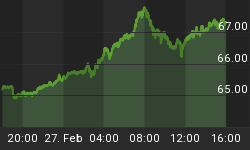The bitcoin futures market is about to heat up. Whether that is good or bad for bitcoin prices is a moot point.
On August 3, Intercontinental Exchange (NYSE:ICE), a global operator of exchanges, clearing houses and data listing services announced plans to form a digital asset platform called Bakkt, which will leverage Microsoft’s cloud to create a regulated global ecosystem for digital assets like bitcoin.
The announcement caught the attention of the crypto community for several reasons.
First off, Bakkt will bring together a marquee group of organizations including Microsoft, Starbucks, BCG and others in one of the biggest collaborations between corporate heavyweights in a crypto project.
Second, whereas Bakkt will resemble existing digital assets in some ways, it will offer an interesting level of differentiation in that it will be the first bitcoin futures contract that will be settled in actual physical bitcoin, with delivery done within a day. That’s an important difference because CME and CBOE contracts are settled in cash.
Part of the Community Is Excited…
The announcement has elicited varying response from experts and the cryptocurrency community.
Fund manager and CNBC presenter Brian Kelly termed it “biggest news of the year for Bitcoin”, while Tom Lee of Fundstrat Global Advisors singled out Starbucks’ involvement as a “very big deal”. Related: Gold Could Fall Lower In Coming Weeks
A Twitter user known as Parabolic Trav said the announcement was “absolutely earth-shattering,” but more importantly noted that it had the potential to render the hotly anticipated bitcoin ETF redundant:

(Click to enlarge)
But Others – Are Less Enamored
First off, Starbucks has pretty much poured cold water on the hype by announcing that customers still won’t be able to pay for Frappuccinos with bitcoin:
“It is important to clarify that we are not accepting digital assets at Starbucks. Rather the exchange will convert digital assets like Bitcoin into US dollars, which can be used at Starbucks,” a spokesperson wrote in emailed comments to Vice.
The excitement is perfectly in order. After all, the more institutional money flows into crypto the more it will boost prices and facilitate faster buildout of professional-grade infrastructure, which will encourage even more professional investors to jump in a virtuous circle.
At least that’s how it’s supposed to work in theory. The reality of institutional involvement in crypto, however, tells a different story.
Bitcoin is down more than 50 percent of since CBOE launched its first futures on December 10, 2017. CME launched its own bitcoin futures about a week later. Whereas cryptos have been dogged by regulatory uncertainty, futures have generally been well accepted since the derivatives are ubiquitous across financial markets.
Related: Musk’s Tesla Tweet Sparks Speculation Storm
As Quartz aptly pointed out, there have been at least four other instances of similar announcements with none having a discernible positive effect on bitcoin prices—at least not yet.

(Click to enlarge)
Source: Quartz
These have not been idle bluster either. In May, the New York Times reported that Goldman Sachs was looking for ways to trade actual crypto and will post bids and offers for bitcoin futures.
Bad Actor Behind the Scenes?
Curiously, even the July 2 announcement by Coinbase that it was rolling out a crypto custodial service to safeguard digital securities left the market nonplussed. After all, protecting crypto holdings is a big deal in a world where the propensity for exchanges to get hacked keeps growing.
One might even argue that that bitcoin has stalled ever since the first futures made their debut, so maybe the Bakkt derivatives will give us more of the same. After all, Tom Lee himself suspects as much.
By Alex Kimani for Safehaven.com
More Top Reads From Safehaven.com
















